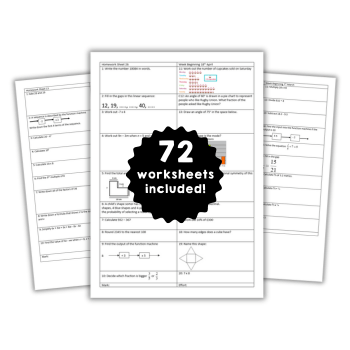The employment skills Ofsted look for – and why maths teachers should talk to careers advisers…

Richard Coles explains why there’s a case to be made for going beyond the curriculum and using maths to better prepare students for the world of work

We often hear from employers, officials and members of the public that today’s school leavers lack the kind of mathematical skills the economy and wider society really need. But what skills might those be, and are schools themselves really to blame for this alleged shortage?
Here, I’ll look to share my experiences as both a careers provision lead and maths teacher, examining how students can be given the opportunities they’ll need to be successful in life and work beyond school, and how your subjects – particularly maths – can be used as stepping stones to reach those goals.
‘Ofsted-ready’
When I first joined Brockhill Park Performing Arts College, there was still a year to go before the Gatsby Benchmark statements became a compulsory requirement. This gave us time to evaluate the needs of our pupils, assess the (often excellent) work already taking place and design a program that could support our pupils in gaining local employment, accessing top universities or entering apprenticeships.
In the view of Ofsted, at least, we succeeded in what we’d set out to do. Our most recent inspection rated the school’s careers provision as Good, based on a review of our website’s careers information, a follow-up discussion I had with inspectors regarding our careers program and visits to several subject areas to corroborate what I’d said and ensure we were being consistent in our careers provision.
At Brockhill Park, we expect subject departments to engage with our careers provision in several key ways. What I will now share with you here are the suggestions we have given our own maths department on how to prepare for an inspection:
Research your school’s careers information
Familiarise yourself with how it aims to support departments, and what it suggests should be covered in schemes of work. Is there a non-exhaustive list of activities and/or discussions detailed somewhere?
Read your department’s Schemes of Work
Are there any opportunities within your scheme of work for establishing career links, and are these matched to the whole school plan? Does your scheme of work take account of important maths-related career days throughout the year, such as ‘Pi Day’?
Consult with your local universities
Regular collaborations with local universities can help to seed aspirations for further study or entry into specific careers, particularly for students in Y9 and Y10.
Embed careers education into your curriculum model
Are there related careers posters in your department’s classroom? Showing aspirational jobs that can be attained via entry from different routes may be an easy win. Stating the average earnings for such jobs could help generate discussions, though remember to balance out your discussion of FE, college, apprenticeships and other potential routes your students could follow.
Ongoing activities
Outside of inspections, effectively linking your maths teaching to your careers provision can improve engagement and outcomes in a number of different ways.
When introducing a new topic, why not inform pupils of the topic’s links to specific jobs and careers? That way, you can get ahead of at least some of the usual ‘When am I ever going to need this?’ protests and complaints.
If you were to introduce constructions and loci, for example, you could serve up the classic ‘goat on a rope’ activity – but wouldn’t it be better to demonstrate the principles of the topic via an activity linked to, say, town planning – deciding where to lay vital infrastructure, and setting out conditions that will require students to draw on different concepts?
Another approach could involve the use of careers plenaries. A quickfire plenary idea might involve posing students the following questions, among others:
• How might you use the skills you learnt today in the world of work?
• Did you learn any new skills that helped to develop you as an individual?
Set your pupils the tasks of really engaging in such discussions, and get them talking to each other. Whatever you decide to do as a department in this area, try to be creative.
There’s a whole world of jobs out there, and a good place to start can be to enlist the help of business owners in your local community. If possible, get them to show your pupils why certain subjects and topics are important, and how learning about them helped to advance their own careers and subsequent professional success.
‘Real world’ maths
Many of the local businesses I’ve worked with have expressed a similar message – that pupils often leave school knowing lots of ‘stuff’, but without necessarily knowing how to properly utilise the knowledge and skills they have, due to a lack of contextual understanding or application practise.
I’ve heard it said by multiple business leaders that school leavers would greatly benefit from developing a broader understanding of how businesses operate in practice.
Mathematics lends itself well to learning how businesses are run, since financial capability is obviously a crucial factor in any business’ success. If you’re designing foam for use in trainers and need to make it affordable, where can you cut costs? What level of quality can you afford to sacrifice in order to hit a certain price point?
There are many such ways in which students can apply the maths knowledge they possess to the activities taking place within a realistic business setting. Outside of their working lives, of course, adults also have a variety of other financial commitments to maintain, ranging from the simple to the highly complex.
We do our students a disservice by not teaching them how mortgages function, how credit cards and APR work, or how PAYE is calculated. As a maths teacher, I would routinely link certain topics directly to some of the aforementioned concepts.
Pupils were always appreciative when I did this and would want to know more. Other areas ripe for exploration might include ways of being smarter with respect to one’s personal income, which could encompass investment opportunities, devising a sustainable family budget and something frequently overlooked – retirement planning.
Schools can deliver significant positive impact by developing real-world synergies with their learning; the more the better. Maths teachers can benefit from liaising with their school’s careers lead, and utilising external speakers who can talk to students about the reality of work and adult life.
If you want your curriculum to have a careers-centric approach, then explicitly telling students what you’re doing will give them a deeper understanding of the content, helping them see the importance of the maths they’ll need to be an effective, well-rounded employee and member of society.
Richard Coles is an Associate Assistant Principal at Brockhill Park Performing Arts College (Kent), with responsibility for careers and guidance and its Sixth Form. He is an experienced teacher of maths, having previously been head of department for seven years; for more information, follow @richardcoles10












